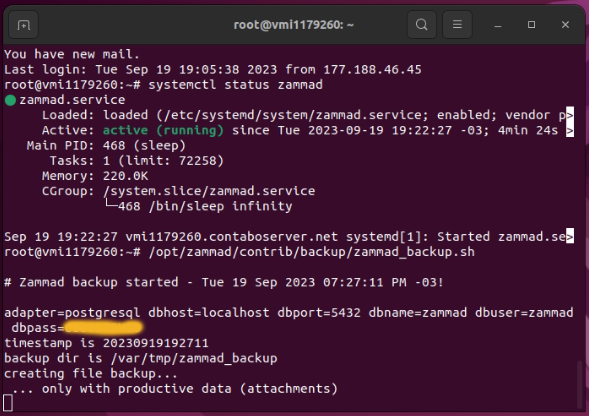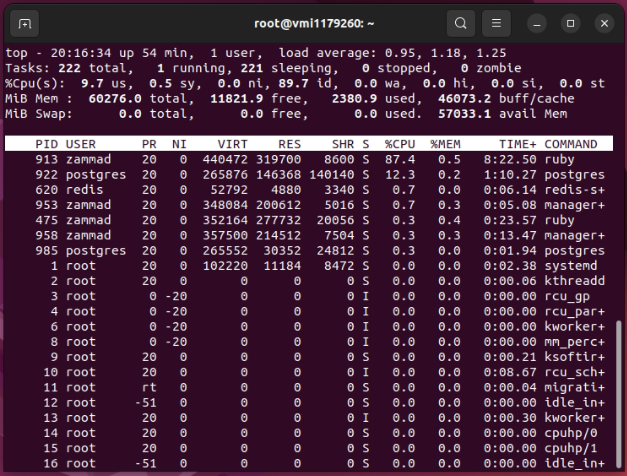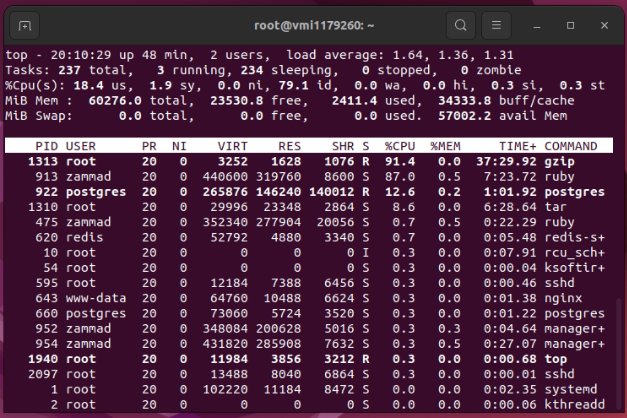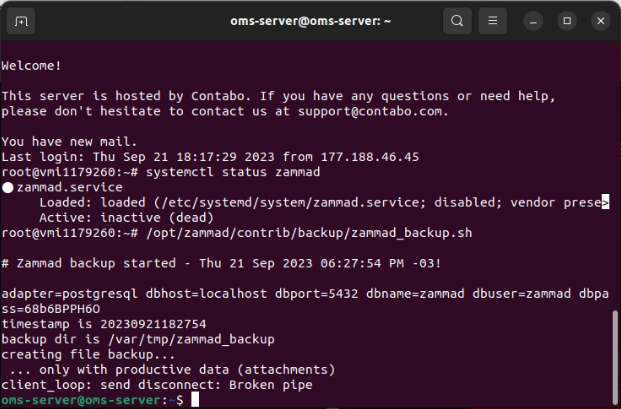Hello, I will send you the PostgreSQL log from the last time this happened. I can’t run a new backup right now because we are using it. As soon as our workday ends, I’ll run it again. Here’s the log that appears when it freezes:
2023-09-09 21:45:10.933 CEST [576416] zammad@zammad LOG: could not send data to client: Broken pipe
2023-09-09 21:45:10.933 CEST [576416] zammad@zammad STATEMENT: SELECT c.tableoid, c.oid, c.relname, (SELECT pg_catalog.array_agg(acl ORDER BY row_n) FROM (SELECT acl, row_n FROM pg_catalog.unnest(coalesce(c.relacl,pg_catalog.acldefault(CASE WHEN c.relkind = ‘S’ THEN ‘s’ ELSE ‘r’ END::“char”,c.relowner))) WITH ORDINALITY AS perm(acl,row_n) WHERE NOT EXISTS ( SELECT 1 FROM pg_catalog.unnest(coalesce(pip.initprivs,pg_catalog.acldefault(CASE WHEN c.relkind = ‘S’ THEN ‘s’ ELSE ‘r’ END::“char”,c.relowner))) AS init(init_acl) WHERE acl = init_acl)) as foo) AS relacl, (SELECT pg_catalog.array_agg(acl ORDER BY row_n) FROM (SELECT acl, row_n FROM pg_catalog.unnest(coalesce(pip.initprivs,pg_catalog.acldefault(CASE WHEN c.relkind = ‘S’ THEN ‘s’ ELSE ‘r’ END::“char”,c.relowner))) WITH ORDINALITY AS initp(acl,row_n) WHERE NOT EXISTS ( SELECT 1 FROM pg_catalog.unnest(coalesce(c.relacl,pg_catalog.acldefault(CASE WHEN c.relkind = ‘S’ THEN ‘s’ ELSE ‘r’ END::“char”,c.relowner))) AS permp(orig_acl) WHERE acl = orig_acl)) as foo) as rrelacl, NULL AS initrelacl, NULL as initrrelacl, c.relkind, c.relnamespace, (SELECT rolname FROM pg_catalog.pg_roles WHERE oid = c.relowner) AS rolname, c.relchecks, c.relhastriggers, c.relhasindex, c.relhasrules, ‘f’::bool AS relhasoids, c.relrowsecurity, c.relforcerowsecurity, c.relfrozenxid, c.relminmxid, tc.oid AS toid, tc.relfrozenxid AS tfrozenxid, tc.relminmxid AS tminmxid, c.relpersistence, c.relispopulated, c.relreplident, c.relpages, am.amname, c.reloftype, d.refobjid AS owning_tab, d.refobjsubid AS owning_col, (SELECT spcname FROM pg_tablespace t WHERE t.oid = c.reltablespace) AS reltablespace, array_remove(array_remove(c.reloptions,‘check_option=local’),‘check_option=cascaded’) AS reloptions, CASE WHEN ‘check_option=local’ = ANY (c.reloptions) THEN ‘LOCAL’::text WHEN ‘check_option=cascaded’ = ANY (c.reloptions) THEN ‘CASCADED’::text ELSE NULL END AS checkoption, tc.reloptions AS toast_reloptions, c.relkind = ‘S’ AND EXISTS (SELECT 1 FROM pg_depend WHERE classid = ‘pg_class’::regclass AND objid = c.oid AND objsubid = 0 AND refclassid = ‘pg_class’::regclass AND deptype = ‘i’) AS is_identity_sequence, EXISTS (SELECT 1 FROM pg_attribute at LEFT JOIN pg_init_privs pip ON (c.oid = pip.objoid AND pip.classoid = ‘pg_class’::regclass AND pip.objsubid = at.attnum)WHERE at.attrelid = c.oid AND ((SELECT pg_catalog.array_agg(acl ORDER BY row_n) FROM (SELECT acl, row_n FROM pg_catalog.unnest(coalesce(at.attacl,pg_catalog.acldefault(‘c’,c.relowner))) WITH ORDINALITY AS perm(acl,row_n) WHERE NOT EXISTS ( SELECT 1 FROM pg_catalog.unnest(coalesce(pip.initprivs,pg_catalog.acldefault(‘c’,c.relowner))) AS init(init_acl) WHERE acl = init_acl)) as foo) IS NOT NULL OR (SELECT pg_catalog.array_agg(acl ORDER BY row_n) FROM (SELECT acl, row_n FROM pg_catalog.unnest(coalesce(pip.initprivs,pg_catalog.acldefault(‘c’,c.relowner))) WITH ORDINALITY AS initp(acl,row_n) WHERE NOT EXISTS ( SELECT 1 FROM pg_catalog.unnest(coalesce(at.attacl,pg_catalog.acldefault(‘c’,c.relowner))) AS permp(orig_acl) WHERE acl = orig_acl)) as foo) IS NOT NULL OR NULL IS NOT NULL OR NULL IS NOT NULL))AS changed_acl, c.relispartition AS ispartition FROM pg_class c LEFT JOIN pg_depend d ON (c.relkind = ‘S’ AND d.classid = c.tableoid AND d.objid = c.oid AND d.objsubid = 0 AND d.refclassid = c.tableoid AND d.deptype IN (‘a’, ‘i’)) LEFT JOIN pg_class tc ON (c.reltoastrelid = tc.oid AND c.relkind <> ‘p’) LEFT JOIN pg_am am ON (c.relam = am.oid) LEFT JOIN pg_init_privs pip ON (c.oid = pip.objoid AND pip.classoid = ‘pg_class’::regclass AND pip.objsubid = 0) WHERE c.relkind in (‘r’, ‘S’, ‘v’, ‘c’, ‘m’, ‘f’, ‘p’) ORDER BY c.oid
2023-09-09 21:45:10.937 CEST [576416] zammad@zammad FATAL: connection to client lost
2023-09-09 21:45:10.937 CEST [576416] zammad@zammad STATEMENT: SELECT c.tableoid, c.oid, c.relname, (SELECT pg_catalog.array_agg(acl ORDER BY row_n) FROM (SELECT acl, row_n FROM pg_catalog.unnest(coalesce(c.relacl,pg_catalog.acldefault(CASE WHEN c.relkind = ‘S’ THEN ‘s’ ELSE ‘r’ END::“char”,c.relowner))) WITH ORDINALITY AS perm(acl,row_n) WHERE NOT EXISTS ( SELECT 1 FROM pg_catalog.unnest(coalesce(pip.initprivs,pg_catalog.acldefault(CASE WHEN c.relkind = ‘S’ THEN ‘s’ ELSE ‘r’ END::“char”,c.relowner))) AS init(init_acl) WHERE acl = init_acl)) as foo) AS relacl, (SELECT pg_catalog.array_agg(acl ORDER BY row_n) FROM (SELECT acl, row_n FROM pg_catalog.unnest(coalesce(pip.initprivs,pg_catalog.acldefault(CASE WHEN c.relkind = ‘S’ THEN ‘s’ ELSE ‘r’ END::“char”,c.relowner))) WITH ORDINALITY AS initp(acl,row_n) WHERE NOT EXISTS ( SELECT 1 FROM pg_catalog.unnest(coalesce(c.relacl,pg_catalog.acldefault(CASE WHEN c.relkind = ‘S’ THEN ‘s’ ELSE ‘r’ END::“char”,c.relowner))) AS permp(orig_acl) WHERE acl = orig_acl)) as foo) as rrelacl, NULL AS initrelacl, NULL as initrrelacl, c.relkind, c.relnamespace, (SELECT rolname FROM pg_catalog.pg_roles WHERE oid = c.relowner) AS rolname, c.relchecks, c.relhastriggers, c.relhasindex, c.relhasrules, ‘f’::bool AS relhasoids, c.relrowsecurity, c.relforcerowsecurity, c.relfrozenxid, c.relminmxid, tc.oid AS toid, tc.relfrozenxid AS tfrozenxid, tc.relminmxid AS tminmxid, c.relpersistence, c.relispopulated, c.relreplident, c.relpages, am.amname, c.reloftype, d.refobjid AS owning_tab, d.refobjsubid AS owning_col, (SELECT spcname FROM pg_tablespace t WHERE t.oid = c.reltablespace) AS reltablespace, array_remove(array_remove(c.reloptions,‘check_option=local’),‘check_option=cascaded’) AS reloptions, CASE WHEN ‘check_option=local’ = ANY (c.reloptions) THEN ‘LOCAL’::text WHEN ‘check_option=cascaded’ = ANY (c.reloptions) THEN ‘CASCADED’::text ELSE NULL END AS checkoption, tc.reloptions AS toast_reloptions, c.relkind = ‘S’ AND EXISTS (SELECT 1 FROM pg_depend WHERE classid = ‘pg_class’::regclass AND objid = c.oid AND objsubid = 0 AND refclassid = ‘pg_class’::regclass AND deptype = ‘i’) AS is_identity_sequence, EXISTS (SELECT 1 FROM pg_attribute at LEFT JOIN pg_init_privs pip ON (c.oid = pip.objoid AND pip.classoid = ‘pg_class’::regclass AND pip.objsubid = at.attnum)WHERE at.attrelid = c.oid AND ((SELECT pg_catalog.array_agg(acl ORDER BY row_n) FROM (SELECT acl, row_n FROM pg_catalog.unnest(coalesce(at.attacl,pg_catalog.acldefault(‘c’,c.relowner))) WITH ORDINALITY AS perm(acl,row_n) WHERE NOT EXISTS ( SELECT 1 FROM pg_catalog.unnest(coalesce(pip.initprivs,pg_catalog.acldefault(‘c’,c.relowner))) AS init(init_acl) WHERE acl = init_acl)) as foo) IS NOT NULL OR (SELECT pg_catalog.array_agg(acl ORDER BY row_n) FROM (SELECT acl, row_n FROM pg_catalog.unnest(coalesce(pip.initprivs,pg_catalog.acldefault(‘c’,c.relowner))) WITH ORDINALITY AS initp(acl,row_n) WHERE NOT EXISTS ( SELECT 1 FROM pg_catalog.unnest(coalesce(at.attacl,pg_catalog.acldefault(‘c’,c.relowner))) AS permp(orig_acl) WHERE acl = orig_acl)) as foo) IS NOT NULL OR NULL IS NOT NULL OR NULL IS NOT NULL))AS changed_acl, c.relispartition AS ispartition FROM pg_class c LEFT JOIN pg_depend d ON (c.relkind = ‘S’ AND d.classid = c.tableoid AND d.objid = c.oid AND d.objsubid = 0 AND d.refclassid = c.tableoid AND d.deptype IN (‘a’, ‘i’)) LEFT JOIN pg_class tc ON (c.reltoastrelid = tc.oid AND c.relkind <> ‘p’) LEFT JOIN pg_am am ON (c.relam = am.oid) LEFT JOIN pg_init_privs pip ON (c.oid = pip.objoid AND pip.classoid = ‘pg_class’::regclass AND pip.objsubid = 0) WHERE c.relkind in (‘r’, ‘S’, ‘v’, ‘c’, ‘m’, ‘f’, ‘p’) ORDER BY c.oid




